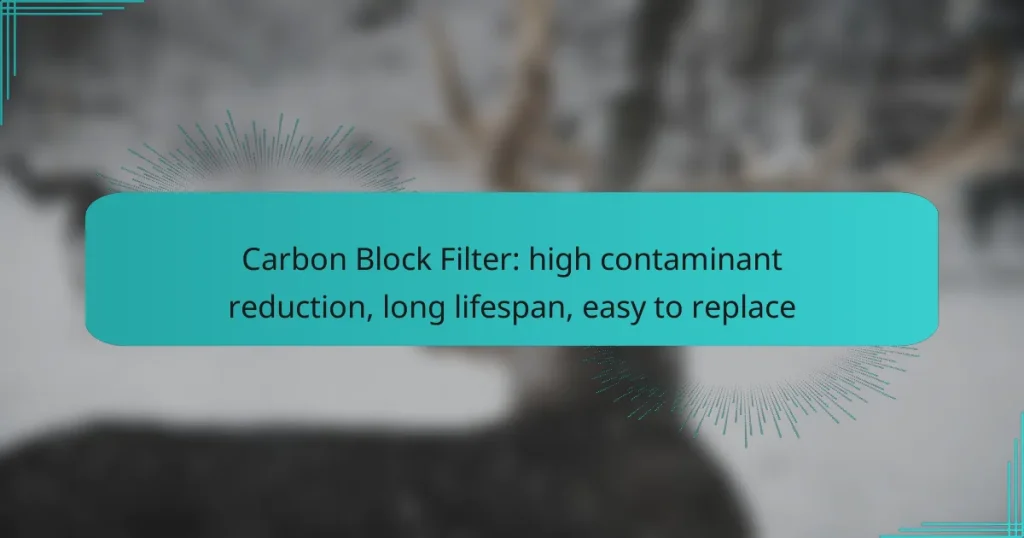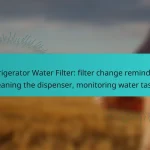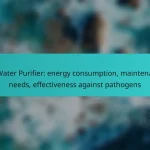Carbon block filters are highly effective in reducing a wide range of contaminants, including chlorine, VOCs, heavy metals, and sediments, by utilizing activated carbon to adsorb impurities from water. With a lifespan of 6 to 12 months, these filters are easy to replace, ensuring that your water remains clean and safe to drink. Regular maintenance and timely replacement are crucial for optimal performance and long-lasting filtration efficiency.
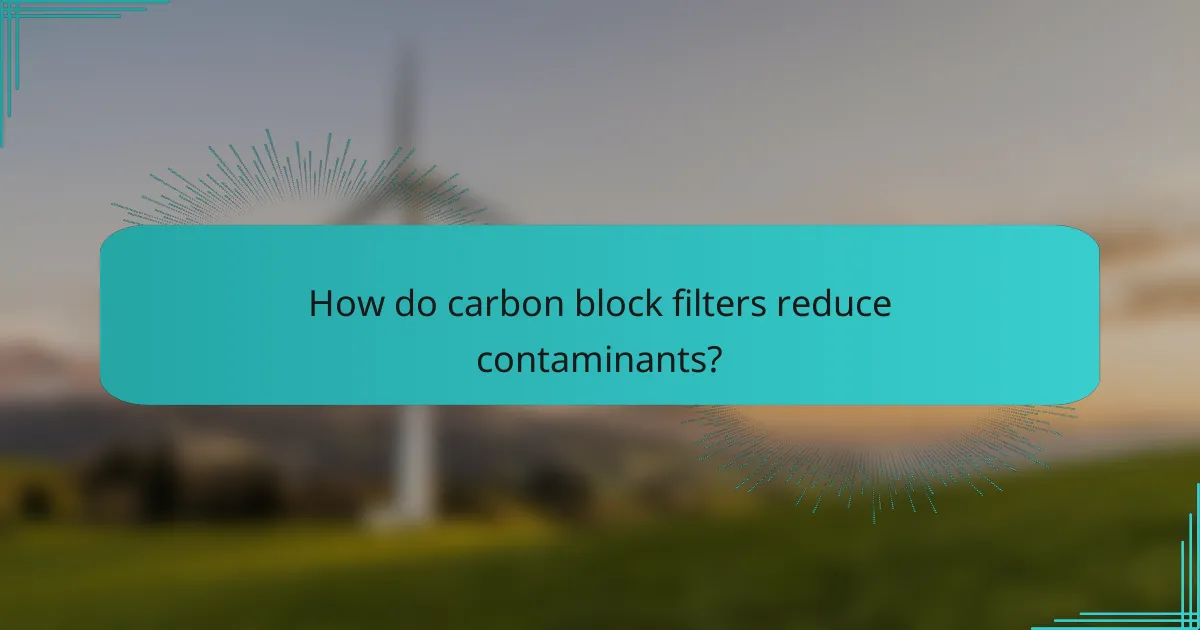
How do carbon block filters reduce contaminants?
Carbon block filters reduce contaminants by using activated carbon to adsorb impurities from water. This process effectively traps chlorine, volatile organic compounds (VOCs), heavy metals, and sediments, resulting in cleaner drinking water.
High efficacy against chlorine and VOCs
Carbon block filters are particularly effective at removing chlorine and VOCs, which are common water contaminants. The activated carbon’s porous structure allows it to capture these chemicals, significantly improving water quality.
Many carbon block filters can reduce chlorine levels by over 90%, making them a reliable choice for households concerned about chemical exposure. Regular replacement of the filter is essential to maintain this high level of efficacy.
Removal of heavy metals and sediment
In addition to chlorine and VOCs, carbon block filters can also remove heavy metals such as lead and mercury, along with sediment particles. This is crucial for ensuring safe drinking water, especially in areas with aging infrastructure.
Filters designed for heavy metal removal often meet specific standards, such as NSF/ANSI 53, ensuring they effectively reduce contaminants to safe levels. Regular maintenance and timely replacement are key to sustaining their performance.
Improved taste and odor of water
Using a carbon block filter can significantly enhance the taste and odor of tap water. By removing chlorine and other impurities, these filters provide a fresher, cleaner flavor that many users find more palatable.
For those sensitive to unpleasant tastes or smells, investing in a quality carbon block filter can lead to a noticeable improvement in drinking water quality. This can encourage more water consumption, contributing to better hydration and overall health.

What is the lifespan of a carbon block filter?
The lifespan of a carbon block filter typically ranges from 6 to 12 months, depending on usage and water quality. Regular replacement is essential to maintain effective contaminant reduction and ensure optimal performance.
Average lifespan of 6 to 12 months
Most carbon block filters are designed to last between 6 to 12 months under normal conditions. This timeframe can vary based on factors such as water usage and the concentration of contaminants present. For households with higher water demands or poor water quality, replacing the filter closer to the 6-month mark is advisable.
Monitoring the filter’s performance can help determine when to replace it. Signs of reduced flow rate or changes in taste or odor may indicate that the filter is nearing the end of its lifespan.
Factors affecting filter longevity
Several factors can influence the longevity of a carbon block filter. Water quality is a primary consideration; filters in areas with high levels of sediment or contaminants may clog faster, reducing their effective lifespan. Additionally, the volume of water filtered daily plays a significant role; higher usage typically leads to more frequent replacements.
Environmental conditions, such as temperature and humidity, can also impact filter performance. For example, filters stored in damp areas may degrade faster. Regularly checking and maintaining the filter system can help extend its life and ensure it operates efficiently.
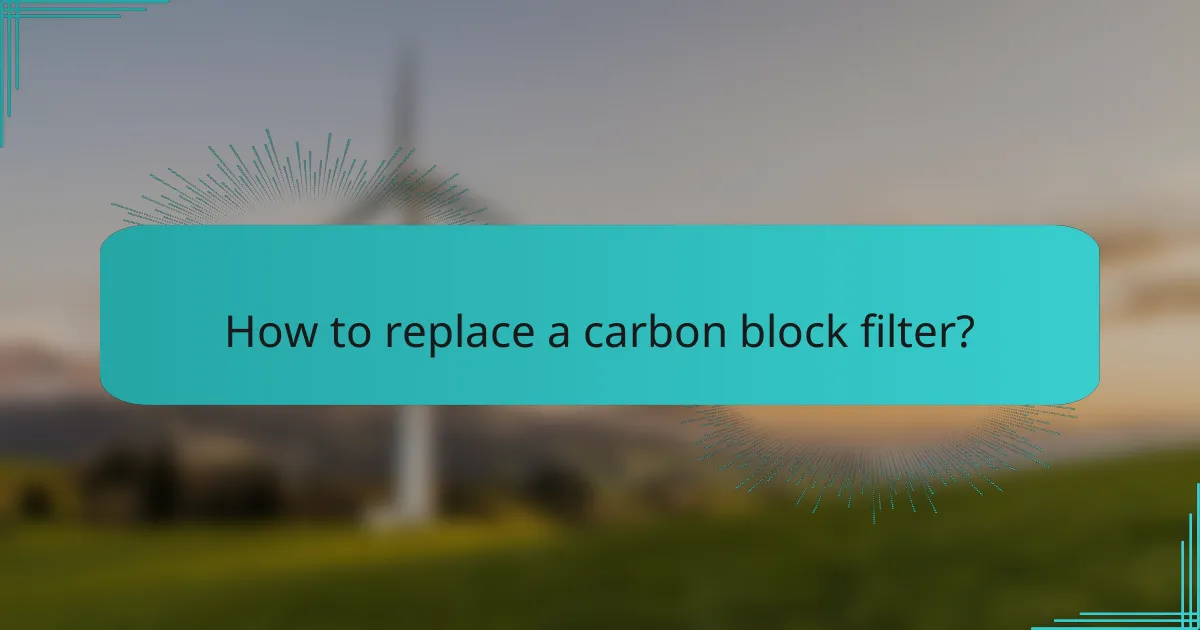
How to replace a carbon block filter?
Replacing a carbon block filter is a straightforward process that significantly improves water quality by reducing contaminants. Regular replacement ensures optimal performance and longevity of your filtration system.
Step-by-step replacement process
Start by turning off the water supply to prevent leaks. Next, remove the filter housing by twisting it counterclockwise, and carefully take out the old carbon block filter. Rinse the housing with clean water to eliminate any residual particles before inserting the new filter.
Once the new carbon block filter is in place, reassemble the housing by twisting it back on securely. Finally, turn the water supply back on and check for any leaks. It’s advisable to run water through the system for a few minutes to flush out any loose carbon particles.
Tools needed for replacement
To replace a carbon block filter, you typically need a few basic tools. A filter wrench can be helpful for loosening the housing, especially if it’s tightly sealed. Additionally, having a bucket or towel on hand can catch any water that may spill during the process.
In some cases, you may also need pliers to help grip the housing or a utility knife to cut any tape or seals. Always ensure you have the correct replacement filter compatible with your system to avoid any issues during installation.

What are the benefits of using carbon block filters in the UK?
Carbon block filters offer significant advantages in contaminant reduction, longevity, and ease of replacement, making them a popular choice for water purification in the UK. These filters effectively remove impurities while maintaining a long lifespan, which translates to cost savings and convenience for users.
Cost-effective water purification
Carbon block filters are known for their cost-effectiveness in water purification. They typically reduce a wide range of contaminants, including chlorine, sediment, and volatile organic compounds, which can improve the taste and safety of drinking water. The initial investment in a carbon block filter often pays off over time due to the reduced need for bottled water and lower maintenance costs.
In the UK, the price of carbon block filters can vary, but they generally range from £20 to £100 depending on the brand and specifications. This affordability, combined with their efficiency, makes them an attractive option for households looking to enhance their water quality without breaking the bank.
Compatibility with various filtration systems
Carbon block filters are highly versatile and can be integrated into various water filtration systems, including under-sink, countertop, and whole-house setups. This compatibility allows users to upgrade their existing systems without needing to purchase entirely new equipment. Many manufacturers design their filters to fit standard connections, making installation straightforward.
When selecting a carbon block filter, it’s essential to check compatibility with your specific filtration system. Some filters may require additional adapters or modifications, so reviewing product specifications before purchase can help avoid installation issues. This adaptability ensures that users can enjoy improved water quality regardless of their current setup.
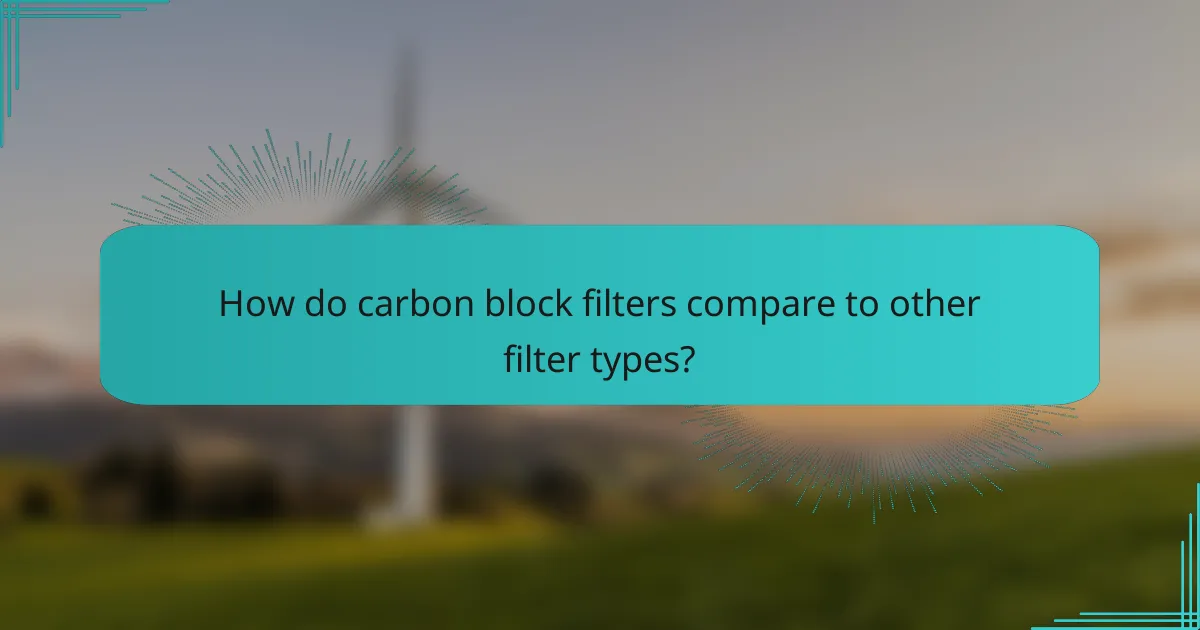
How do carbon block filters compare to other filter types?
Carbon block filters excel in contaminant reduction, lifespan, and ease of replacement compared to other filter types. They effectively remove a wide range of impurities while maintaining a long service life, making them a popular choice for water filtration systems.
Comparison with activated carbon filters
While both carbon block filters and activated carbon filters utilize carbon for purification, carbon block filters generally provide superior contaminant reduction. The dense structure of carbon blocks allows for a more thorough filtration process, capturing finer particles and a broader spectrum of contaminants.
Activated carbon filters often have a larger surface area but may allow some impurities to pass through due to their loose structure. In contrast, carbon block filters are designed to minimize this risk, making them a more reliable option for those concerned about water quality.
Comparison with reverse osmosis systems
Reverse osmosis systems are known for their ability to remove a wide range of contaminants, including dissolved solids, but they can be more complex and costly to maintain than carbon block filters. Carbon block filters, on the other hand, are simpler to install and replace, making them a convenient choice for many households.
While reverse osmosis systems often require additional components and regular maintenance, carbon block filters typically need less frequent replacement and are easier to manage. For those looking for effective filtration without the complexity, carbon block filters are a practical alternative.

What are the certifications for carbon block filters?
Carbon block filters are often certified to ensure they meet specific performance and safety standards. These certifications help consumers identify products that effectively reduce contaminants and maintain water quality.
NSF/ANSI certifications
The NSF/ANSI certifications are crucial for carbon block filters, indicating they meet rigorous safety and performance standards. These certifications cover various aspects, including contaminant reduction, material safety, and structural integrity.
Common NSF/ANSI standards for carbon block filters include NSF/ANSI 42, which addresses aesthetic effects like taste and odor, and NSF/ANSI 53, which focuses on health effects, ensuring the filter effectively reduces harmful substances. Look for these certifications when selecting a filter to ensure reliable performance.
Water Quality Association (WQA) standards
The Water Quality Association (WQA) also provides certifications for carbon block filters, emphasizing their effectiveness in improving water quality. WQA-certified products have undergone thorough testing to verify their contaminant reduction claims.
WQA certifications often include the Gold Seal, which signifies that the filter has met or exceeded industry standards. Choosing a WQA-certified filter can give consumers confidence in the product’s ability to deliver clean, safe drinking water.
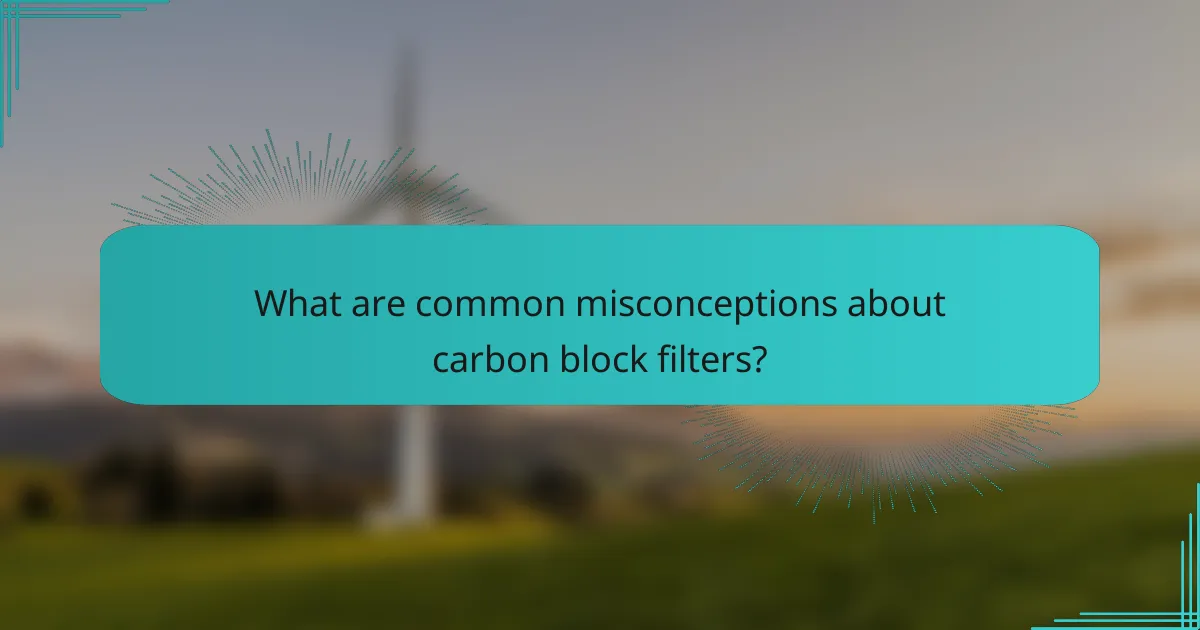
What are common misconceptions about carbon block filters?
Many people misunderstand carbon block filters, believing they function similarly to all water filters or that they need to be replaced frequently. In reality, carbon block filters are designed for high contaminant reduction and can have a long lifespan when properly maintained.
Myth: All filters are the same
Not all filters are created equal. Carbon block filters specifically use activated carbon to adsorb contaminants, which makes them highly effective at removing chlorine, sediment, and volatile organic compounds (VOCs) from water. Other filter types, such as sediment or reverse osmosis filters, may target different contaminants and have varying efficiencies.
For instance, while a sediment filter can remove larger particles, it won’t effectively reduce chemical contaminants like a carbon block filter can. Understanding these differences is crucial for selecting the right filter for your needs.
Myth: Carbon block filters require frequent replacement
Carbon block filters are known for their durability and can last several months to over a year, depending on water quality and usage. Many users mistakenly believe they need to be replaced every few weeks, which is not the case. Regular testing of water quality can help determine the optimal replacement schedule.
To maximize the lifespan of a carbon block filter, ensure proper installation and maintenance. Avoid exposing the filter to extreme temperatures or contaminants that could clog it prematurely. Following the manufacturer’s guidelines will help you maintain its effectiveness and longevity.

What are the future trends in water filtration technology?
Future trends in water filtration technology focus on enhanced efficiency, sustainability, and user convenience. Innovations are leading to filters that not only reduce contaminants more effectively but also have longer lifespans and are easier to replace.
Advancements in filter materials
New materials are being developed to improve the performance of water filters, particularly in contaminant reduction. For instance, advanced carbon block filters are now made with a combination of activated carbon and other substances that enhance their ability to capture impurities.
These materials often feature a higher surface area and improved porosity, allowing for better adsorption of contaminants. As a result, users can expect significant reductions in chlorine, heavy metals, and other harmful substances in their drinking water.
When selecting a filter, consider the specific contaminants present in your water supply. Look for filters that meet or exceed NSF/ANSI standards relevant to your needs, ensuring you choose a product that effectively addresses your water quality concerns.
